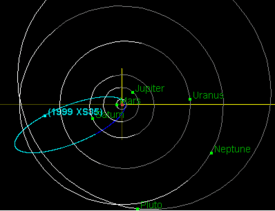1999 XS35
|
The comet-like orbit of 1999 XS35 | |
| Discovery[1] | |
|---|---|
| Discovered by |
Lowell Observatory-LONEOS (699) 0.59-m Schmidt |
| Discovery date | 1999-12-02 |
| Designations | |
| MPC designation | 1999 XS35 |
|
PHA Apollo[2] | |
| Orbital characteristics[2] | |
|
Epoch 2012-Mar-14 (JD 2456000.5) T_jup = 1.407 | |
| Aphelion |
34.7 AU (Q) (beyond Neptune) |
| Perihelion | 0.935 AU (q) |
| 17.8 AU (a) | |
| Eccentricity | 0.947 |
| 75.2 yr | |
| 59.2° (M) | |
| Inclination | 19.5° |
| 48.8° | |
| 333° | |
| Physical characteristics | |
| Dimensions | 1–2 km[2][3] |
| 13.7 to 32 | |
| 17.2[2] | |
|
| |
1999 XS35 is a damocloid discovered in 1999 having a comet-like orbit. Its semi-major axis is 17.8 AU. Its orbital eccentricity is 0.94, which means that at the perihelion 1999 XS35 comes as close as 0.9 AU to the Sun, while at the aphelion it reaches beyond the orbit of Neptune.[2] 1999 XS35 is a damocloid. 1999 XS35 is a small object with an absolute magnitude (H) of 17.2, which implies a size of about 1 km.[4]
1999 XS35 came to perihelion on 21 October 1999,[2] passed 0.0453 AU (6,780,000 km; 4,210,000 mi) from Earth on 5 November 1999,[5] and was discovered on 2 December 1999 at about apparent magnitude 16.9.[1]
References
- 1 2 "MPEC 1999-X19 : 1999 XS35". IAU Minor Planet Center. 1999-12-09. Retrieved 2012-04-18.
- 1 2 3 4 5 6 "JPL Small-Body Database Browser: (1999 XS35)" (last observation: 2000-02-28; arc: 88 days; uncertainty: 4). Jet Propulsion Laboratory. Retrieved 2012-04-18.
- ↑ "Absolute Magnitude (H)". NASA/JPL. Archived from the original on 26 November 2009.
- ↑ Fernández, Yanga R. (2010). "Asteroids with Comet-Like Orbits: Elements and Positions". Archived from the original on 5 June 2010. Retrieved 30 May 2010.
- ↑ "JPL Close-Approach Data: (1999 XS35)" (last observation: 2000-02-28; arc: 88 days; uncertainty: 4). Retrieved 2012-04-18.
External links
- Orbital simulation from JPL (Java) / Ephemeris
This article is issued from Wikipedia - version of the Monday, January 11, 2016. The text is available under the Creative Commons Attribution/Share Alike but additional terms may apply for the media files.
